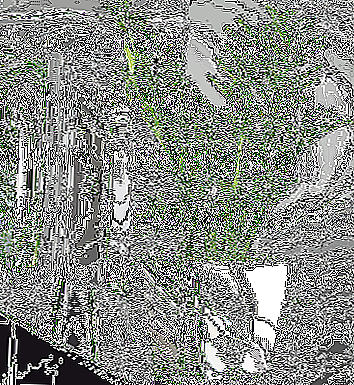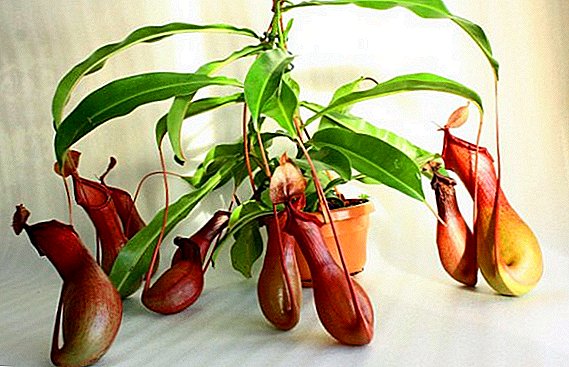 Brahmi grass has several names - Bacopa Monier, Bram, Indian shistolistnik. It has been known for more than 3,000 years; it was referred to in ancient writings as a plant that allows one to "acquire wisdom" or "promotes the knowledge of Brahman." And today, this plant is widely used in the traditional system of Indian medicine - Ayurveda, in addition, it is included in the composition of conventional medical devices.
Brahmi grass has several names - Bacopa Monier, Bram, Indian shistolistnik. It has been known for more than 3,000 years; it was referred to in ancient writings as a plant that allows one to "acquire wisdom" or "promotes the knowledge of Brahman." And today, this plant is widely used in the traditional system of Indian medicine - Ayurveda, in addition, it is included in the composition of conventional medical devices.
How it looks and where it grows
Brahmi can be recognized by narrowly lodging or creeping stems with small ovate or broadly elliptical leaves of 5-6 mm green, olive green in color with small notches on the edges, emitting a characteristic lemon scent. The grass received its name "Brahmi" from the name of the Supreme Hindu Deity Brahma, the creator of the Universe.
Familiarize yourself with the features of growing an ornamental bakopa plant.
The long flowering of Brahmi occurs in the summer. The flowers are very small in the form of tubes, but there are also in the form of bells. The perianth has four to five symmetrically spread out white, blue or blue lobes.  It grows in small reservoirs, in swamps or marshy banks in the tropics and subtropics of India, Africa, Asia, Australia and in the southern states of the United States.
It grows in small reservoirs, in swamps or marshy banks in the tropics and subtropics of India, Africa, Asia, Australia and in the southern states of the United States.
Did you know? Ayurveda is the earliest school of medicine known to mankind. It was created by the father of medicine Charak 2500 years ago.
Chemical composition
Monier owes her valuable healing properties of bacopa to its composition. It contains:
- alkaloids: herpestin, brahmin;
- steroid saponins: bakazid A, bakazid B, gersaponin, manerin;
- sugar alcohols (mannitol);
- phytosterols (beta-sitosterol, stigmasterol);
- flavonoids (luteolin, apigenin);
- Khersapaine;
- quercetin;
- betulic acid;
- cardiac triterpenoids.
Medicinal properties
 Brahmi has not yet been fully studied, but already known facts suggest that the healing herb has qualities:
Brahmi has not yet been fully studied, but already known facts suggest that the healing herb has qualities:
- improve memory;
- increase concentration;
- by strengthening blood vessels and increasing blood flow to stimulate the brain;
- purify the blood;
- strengthen the immune system;
- prevent stress by removing tension and fatigue after intellectual stress;
- normalize the liver, adrenal glands, kidneys and lungs;
- reduce high pressure;
- relieve anxiety and depressive syndromes;
- have a calming effect;
- put sleep in order, heal insomnia;
- quickly relieve headaches;
- lower cholesterol;
- return the rumor;
- promote the rapid healing of severe ulcers and wounds, resorption of skin seals, scars;
- improve the skin;
- thanks to asiaticosides to help the body fight psoriasis;
- assist in the fight against male impotence;
- increase libido.
Did you know? Spiritual practitioners recommend to drink a cup of Brahmi tea with honey on the eve of meditation.

Pharmacy drugs
Brahmi herb is widely used in modern preparations. We will talk about some of them based on this plant:
- Brahmi Bati. Dietary supplement, in which, besides Brahmi itself, there is calamus, black pepper and shankha pushpi. Use one or two capsules twice a day, washed down with warm water for at least two months with prolonged nerve disorders, headaches, high intellectual loads, loss of memory, baldness, "black disease", certain skin ailments, nervous convulsions and premature aging.
- "Brahmi churna". It is also a dietary supplement, taken with hot milk and honey, in a dose of 200 to 700 mg once or twice a day. Preventive course - no more than a hundred days, then also a one-day pause, and repeat. Recommended for any disorders of the brain, memory problems, epilepsy, nervous convulsions, intense mental activity. Particularly recommended for people over 60 years old - an annual course of admission for 50 days.
- "Brahmi Himalaya". Soothing tonic, improving mental abilities, ability to learn. It has a sedative effect and can be used for certain mental disorders. It is used to eliminate child anxiety, increase memory, cognitive abilities and concentration. It is used one capsule per day before meals. Children to give from the age of 14.

Application
The use of Brahmi is very wide, the tools based on it are used for:
- mental and mental disorders;
- skin diseases;
- mental or mental disturbances;
- nervous convulsions;
- memory impairment and difficulty concentrating;
- loss of sleep;
- headaches;
- epilepsy;
- senile indisposition;
- baldness;
- high pressure and prolonged venous insufficiency.
 Even with the help of brahmi they treat:
Even with the help of brahmi they treat:- asthma;
- venereal diseases;
- heart ailments;
- phlebeurysm;
- hemorrhoids;
- rheumatism, sciatica and arthritis;
- tuberculosis, hoarseness, cough.
- Brain activity. Tonic for the brain. Activates intellectual function, improves memory and the ability to concentrate attention. It is extremely useful for high intellectual loads. Rejuvenates brain cells and normalizes hemodynamics. It is recommended to take after a strong intellectual load - the Indian leavede will relieve fatigue, reduce stress effects, relieve headaches.
- Nervous system. Eliminate the consequences of nerve shock and head injury, restore the normal functioning of the nervous system. Relieve nervous excitement, relieve stress, anxiety and anxiety. It helps in the treatment of depression, especially postpartum. Regular intake will calm and relax. Eliminates the state of burden and anxiety, assists in the treatment of behavioral disorders. A unique anti-depressant that stimulates brain activity and simultaneously soothes the nerves.
- Skin diseases. It has astringent properties, activates the production of fibrillar protein, which forms the basis of the dermis, and thereby contributes to the accelerated healing of wounds, scar resorption. They are also treated with scleroderma. With regular use, vessels and capillaries are strengthened, blood supply improves, blood flow to diseased areas is activated, which results in their quicker recovery.
With the skin diseases will help cope, sap pine.

Important! Brahmi has the property of enhancing the effect of hypnotic drugs.
In folk medicine
Folk healers use brahmi as a remedy for:
- depression;
- alarm conditions;
- nervous disorders;
- headaches.
There are several recipes for brahmi:
- From crushed grass. Pour boiling water over one teaspoon with a slide of Brahmi herb. Insist under the lid for 5 to 10 minutes and drink during the meal two or three times a day.
- From powder. On the day: Steam 1-2 g of powder and leave under cover for five minutes. Take the same as the composition of the grass, but can be used with yogurt or drink as an aqueous suspension.
In cosmetology
 And in this area of medicine, healing herbs are actively used, and this is due to:
And in this area of medicine, healing herbs are actively used, and this is due to:
- antioxidant and anti-aging qualities. Stimulates the production of collagen protein by the skin, metabolism, and normalizes hemodynamics. At the cellular level it has a rejuvenating effect of the skin, increases its elasticity;
- anti-inflammatory and antiseptic qualities. Removes inflammation, heals from many skin ailments, such as rashes and psoriasis, well helps with leprosy. Cleans and protects healthy skin;
- wound healing and astringent qualities. Stimulating hemodynamics in diseased places, promotes the speedy healing of wounds, cuts, ulcers. Contributes to the disappearance of hardening and old scars and scars, prevents the emergence of new ones.
In ayuverde brahmi - one of the most sought after herbs for hair care. Due to its beneficial properties, brahmi accelerates the revival of skin cells, normalizes hemodynamics, thereby enhancing the hair roots, activates their growth, and prevents their loss. Recreates the health, volume and elasticity of the hair.
To improve the condition of the hair, it is worth using pine oil, rosemary, nasturtium, jujube, bergamot, green radish.
VIDEO: HOW TO MAKE OIL BROTHERS FOR HAIR
In cooking
The use of brahmi is typical for Asian cuisine. The leaves have a slightly sour taste and are rich in vitamin C. They are thrown into salads, soups, added to rice dishes. Separately from them do the refreshing drinks.
Contraindications and side effects
 However, not everything is as smooth as it seems. Using brami can cause some unpleasant effects:
However, not everything is as smooth as it seems. Using brami can cause some unpleasant effects:
- nausea;
- feeling tired;
- increased perylstatics of pony;
- feeling of dry mouth.
Important! Before using Brami, consult a doctor.In addition, the use of brami is prohibited for a number of ailments:
- bradycardia;
- gastric and intestinal ulcers;
- asthma;
- enfeseme;
- thyroid disease;
- obstruction of the urinary tract.
The main position of ayuverdy is that a person does not need treatment, his body can overcome the ailments himself, he only needs to help with healing herbs. And brami is one such herb, part of the “golden fund” of medicines of Indian national medicine.












